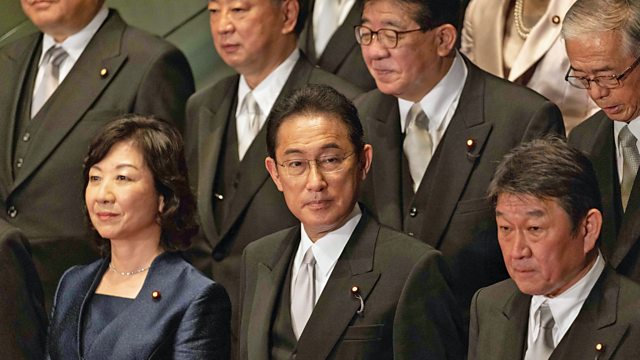Japan's Grey Politics
The new Japanese PM does not break the mould; disaffection grows among Iraq's voters; the politics of coal in Australia; exploring the history of Indian food - as cooked in Kenya
Pascale Harter introduces reportage, analysis and impressions from around the world.
Japanese politics can seem to be set on a repeating loop: regular elections, familiar faces, not much public debate, and an altogether predictable result. Even – or especially – in times of natural disaster, the political scene remains stable. Yet Japan faces a number of increasingly urgent tests. The government’s response to the pandemic – and its decision to go ahead and hold the Olympic Games – did not satisfy everyone. The country’s been watching with alarm as one neighbour, China, builds up its military might - even as another, North Korea, tests out ever more powerful ground-launched missiles. The economy is stagnant, with some deep-seated structural problems, and the population is one of the fastest-ageing in the world. So who have the Japanese turned to, to be the country’s new Prime Minister and lead them through this time of serious challenges? Rupert Wingfield-Hayes reports from Tokyo.
In Iraq politics can often be a matter of life or death. But since the first elections after the US-led international intervention were first held in Iraq in 2005, voter turnout has plummeted. Less than half of eligible Iraqis turned up to last Sunday’s parliamentary polls. People widely say they don’t have much faith in Iraq’s current political system, and many are so disillusioned that they see no point in taking part. Candidates often still run on tribal, ethnic and sectarian lines, rather than by proposing solid policies. Lizzie Porter has been wondering what that says about the county’s future.
Questions about the future of coal have caused some of the deepest divisions in modern Australia. The debate may soon get more heated - as COP26, and other climate-change summits, try to push rich nations to go faster in giving up fossil fuels. Australia still uses coal to generate about 70% of its electricity, making it one of the most carbon-polluting nations per person in the world. And the coal sector’s a huge part of the Australian economy – its exports have kept the country well insulated from global economic shocks. So pushing to go greener, faster, can be a tough sell to voters. Phil Mercer in Sydney explains why the coal habit's so hard to break.
Food is so deeply tied up with our memories and our identity – the language we speak and what we cook are often the most enduring traces of our roots. Migrant communities everywhere hang on to their heritage in the kitchen, and that can end up changing the world. In East Africa, the Asian communities which grew up during the age of British colonial rule certainly left their mark on local tastes – with samosas, curries and chapatis becoming firm favourites among all communities, and African ingredients being cooked with Indian influence. Reha Kansara was brought up in the UK, and recently explored some of her family history in Kenya. She went hunting for the place in Nairobi where one of her oldest favourites was first dreamed up… the delicious potato fritter known as maru bhajia.
(Image: Newly elected Prime Minister Fumio Kishida with his cabinet members. Credit: European Pressphoto Agency/Stanislav Kogiku/Pool)
Last on
Broadcasts
- Sat 16 Oct 2021 15:06GMT���˿��� World Service News Internet
- Sun 17 Oct 2021 03:06GMT���˿��� World Service
- Sun 17 Oct 2021 08:06GMT���˿��� World Service
- Sun 17 Oct 2021 23:06GMT���˿��� World Service

